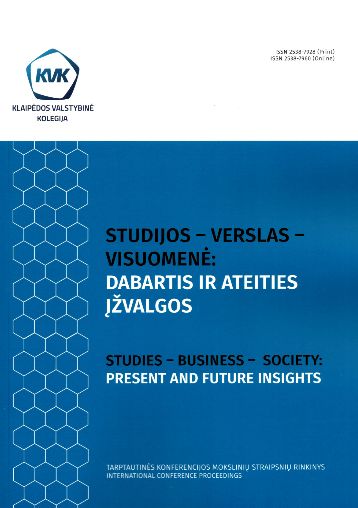SAVIVALDUS VYRESNIO AMŽIAUS SUAUGUSIŲJŲ MOKYMASIS: LITERATŪROS APŽVALGA
DOI:
https://doi.org/10.52320/svv.v1iVII.250Reikšminiai žodžiai:
Savivaldus mokymasis, vyresnio amžiaus suaugusieji, mokymasis vyresniame amžiujeSantrauka
Šiame straipsnyje, remiantis mokslinės literatūros šaltiniais, analizuojamas savivaldus mokymasis vyresniame amžiuje. Siekiama atskleisti kaip vyresnio amžiaus sąlygotas mokymosi kontekstas formuoja savivaldų mokymąsi. Literatūros apžvalga leido nustatyti savivaldaus mokymosi vyresniame amžiuje ypatumus, apimančius savivaldų vyresnių suaugusiųjų mokymąsi sąlygojančius veiksnius, vyresnio amžiaus suaugusiesiems būdingus mokymosi proceso bruožus, bei mokymosi rezultatų svarbą vyresniame amžiuje. Vyresnio amžiaus sąlygotų mokymosi konteksto dimensijų analizė suteikia įžvalgas kaip mokymosi vyresniame amžiuje aplinka daro įtaką savivaldaus mokymosi praktikai.
Atsisiuntimai
Publikuota
Numeris
Skyrius
Licencija
Autorių teisės (c) 2022 Ilvija Pikturnaitė; Salomėja Šatienė

Šis darbas licencijuotas pagal Creative Commons Attribution 4.0 tarptautinę licenciją.

Atskiri straipsniai yra skelbiami „Open Access“ pagal „Creative Commons“ licenciją CC-BY 4.0, leidžiančią neribotai naudoti, platinti ir atgaminti betkokioje laikmenoje, su sąlyga, kad nurodytas originalus autorius ir šaltinis. Autoriai išlaiko autorių teises į savo straipsnius, tačiau suteikia Klaipėdos valstybinei kolegijai pirmojo leidinio teisę.

